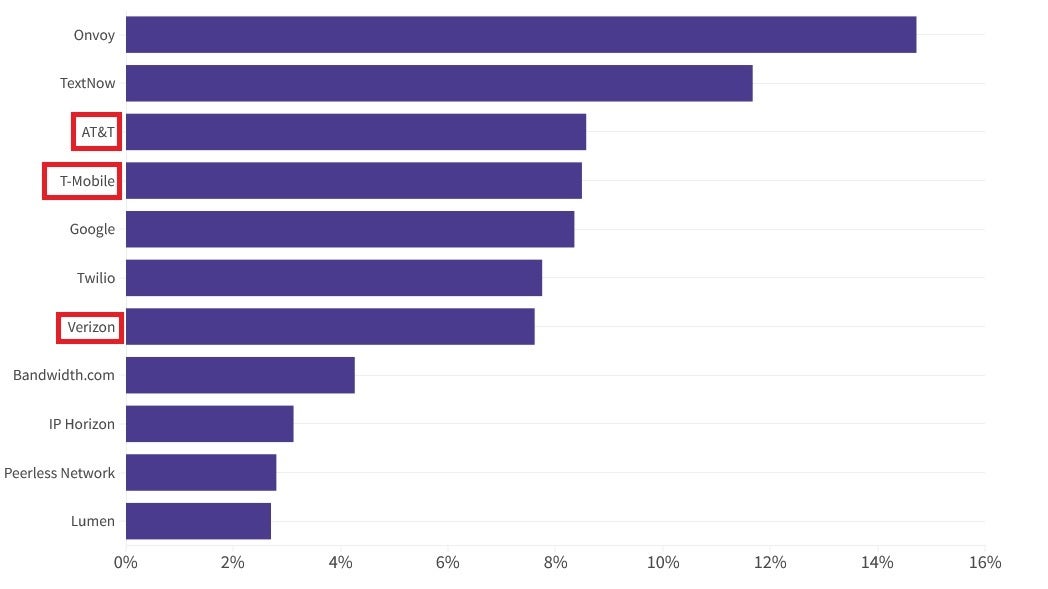Study reveals that these two U.S. carriers are favored by scammers for their mobile scams

Background check company BeenVerified looked at 24 months of data related to scam phone calls and created a list of the carriers most used by scammers to make these calls. The top two names on the list, Onvoy, and TextNow, might not be familiar to you because they are VoIP (Voice over Internet Protocol) providers. These carriers allow customers to make and take calls over the internet, unlike cellular carriers that use cell towers to handle phone calls.
AT&T and T-Mobile were the top two mobile carriers preferred by scammers
From July 2021 through June 2023, a breakdown of scam calls found that non-fixed VoIP numbers were used to carry 60.59% of scam calls followed by 24.11% of such scams that were delivered using the network of a mobile carrier. 8% were made using a fixed-line VoIP and 7.29% used a fixed-line service.

Scammers favored using these carriers and phone companies for their scams
Among the top mobile carriers on the list, AT&T was on top with 8.57% of scams placed over its mobile network. Right behind was T-Mobile whose cell network was used on 8.49% of such scams. Verizon was the last mobile carrier on the list with its network used on 7.61% of the scams that BeenVerified studied. The study consisted of 157,703 call complaints logged on a free reverse phone lookup tool owned and operated by BeenVerified from July 1, 2021, through June 30, 2023.
The study also discovered that scammers favor using text scams. These are texts that make it sound as though you will have your phone service/electricity/cable disconnected unless you make a payment immediately. Because the scammers use services that most people can't do without, this is an easy layup for them. Another top scam is impersonating credit card and banking firms in order to make you give up passwords, PINs, and other confidential information.
One that this writer gets all the time is the ole delivery scam. This involves the receipt of an email that looks as though it came from FedEx, UPS, DHL, or other delivery services. The email says that you missed a delivery and tries to get you to tap on a link and reveal personal data. This is successful because everyone wants to receive a package! This was the top scam during the peak of the pandemic.
And how many of you received a text or email saying that you've won a prize? If you receive such an email, there is often a logo from a major company involved, and sometimes the prize is an expensive flagship phone. Again, the goal is to get you to tap on a link and give up some personal information that the email/text says is needed to collect the prize (like a social security number).
To protect yourself, BeenVerified says that you should do the following:
Sometimes an email that has scam written all over it can be legit
- Check incoming phone numbers using a reverse phone tool (or you can Google the number) to see if the particular number has been the subject of past complaints.
- Think before you act is probably the best advice and before you tap on a link or respond to a call, remember that doing so could result in the theft of your money.
- If you get a call about a bank account or another account that is about to be shut down, call the company directly using a phone number obtained from a legit source.
- Never provide personal data or information about your accounts. This is what scammers want. Do not give it to them.
The problem is that sometimes a message that looks to be fake is real. A few years ago this writer received an email from Verizon that looked like a phishing attack. There were misspelled words and the grammar was a little off. So I called Verizon directly using a phone number that I knew to be one used by Verizon. And it turned out that the e-mail was legitimate. Still, it is always best to be safe than sorry.
Follow us on Google News













Things that are NOT allowed:
To help keep our community safe and free from spam, we apply temporary limits to newly created accounts: